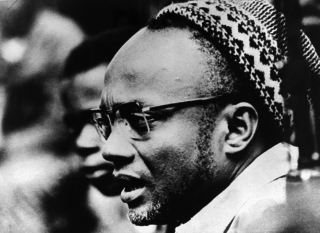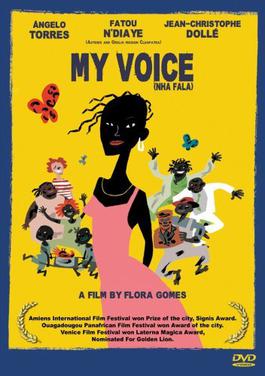
Cape Verde is known internationally for morna, a form of folk music usually sung in the Cape Verdean Creole, accompanied by clarinet, violin, guitar and cavaquinho. Funaná, Coladeira, Batuque and Cabo love are other musical forms.

Amílcar Lopes da Costa Cabral was a Bissau-Guinean and Cape Verdean agricultural engineer, political organizer, and diplomat. He was one of Africa's foremost anti-colonial leaders. He was also a pan-Africanist and intellectual nationalist revolutionary poet.

Kizomba is a social dance and music genre that originated in Angola during late 1970s to early 1980s. Kizomba is a national heritage of Angola and means "party" in Kimbundu. Traditionally, kizomba was danced with family, friends, and acquaintances in social settings such as parties and weddings, but is nowadays also enjoyed in clubs as well as other settings such as Kizomba Na Rua that are popular in Luanda.
Cape Verdean Americans are an ethnic group of Americans whose ancestors were Cape Verdean. In 2010, the American Community Survey stated that there were 95,003 Americans living in the US with Cape Verdean ancestors.

The culture of Cape Verde is rich, with a range of customs and practices common in the islands.

Mayra Andrade is a Cape Verdean singer who lives and records in Lisbon, Portugal.

Cesária ÉvoraGCIH was a Cape Verdean singer known for singing morna, a genre of music from Cape Verde, in her native Cape Verdean Creole. Her songs were often devoted to themes of love, homesickness, nostalgia, and the history of the Cape Verdean people. She was known for performing barefoot and for her habit of smoking and drinking on stage during intermissions. Évora's music has received many accolades, including a Grammy Award in 2004, and it has influenced many Cape Verde diaspora musicians as well as American pop singer Madonna. Évora is also known as Cizé, the Barefoot Diva, and the Queen of Morna.
Tabanka is a musical genre of Cape Verdean music.

Cape Verde or Cabo Verde, officially the Republic of Cabo Verde, is an archipelago and island country of West Africa in the central Atlantic Ocean, consisting of ten volcanic islands with a combined land area of about 4,033 square kilometres (1,557 sq mi). These islands lie between 600 and 850 kilometres west of Cap-Vert, the westernmost point of continental Africa. The Cape Verde islands form part of the Macaronesia ecoregion, along with the Azores, the Canary Islands, Madeira and the Savage Isles.

Sara Alexandra Lima Tavares was a Portuguese singer, composer, guitarist and percussionist. She was born and raised in Lisbon, Portugal. Second-generation Portuguese of Cape Verdean descent, she composed African-, Portuguese- and North American-influenced world music.

Batuque, the Soul of a People is a 2006 documentary film written and directed by Júlio Silvão Tavares about the batuque musical group Raiz di Tambarina, and roots of this musical genre in Santiago, Cape Verde.
Maria Alice may also refer to a Portuguese fadista

The history of the cinema of Cape Verde dates back to the arrival of filmmakers in the early twentieth century. The first picture house was established in Mindelo around 1922, called Eden Park.

Carmen Souza is a Portuguese jazz singer and songwriter of Cape Verdean heritage. She combines traditional forms of Cape Verde with contemporary and traditional jazz.

João Guedes Branco is a French-born Portuguese theatrical actor and reviewer, professor, and programmer. He had a theatrical career for over 30 years and appeared in more than 50 plays, most of them in Mindelo, Cape Verde.

Nha Fala, English title: My Voice is a 2002 internationally co-produced musical film directed by Bissau Guinean director Flora Gomes. The movie stars Fatou N'Diaye, Ángelo Torres, Jean-Christophe Dollé and Bia Gomes.

Cape Verde–Portugal relations are the diplomatic relations between the Republic of Cabo Verde and the Portuguese Republic. Both nations are members of the Community of Portuguese Language Countries and the United Nations.
Júlio Silvão Tavares, is a Cape Verdean filmmaker.
Claire Andrade-Watkins, is a Cape Verdean–American historian and filmmaker. She is an interdisciplinary scholar of African and African American history with a focus on Cape Verdean American history, as well as Post-colonial French. Meanwhile, she excels in Portuguese-speaking African cinema, cinemas of the Africana diaspora, and Black American film and its filmmakers.
Tchinda Andrade is a Cape Verdean LGBT activist and event manager. Andrade was the first trans woman in Cape Verde to come out publicly and quickly became a leading figure in the country's LGBT community, with the country's trans women coming to be known colloquially as "tchindas". Since she came out, LGBT rights in Cape Verde have experienced notable progress, with the country becoming the most LGBT-friendly in Africa. Andrade has also become a leading organiser of the carnival on her island of São Vicente, which was the subject of the 2015 documentary Tchindas.












